Cannabis is a widely used psychoactive drug that tends to be popular among teenagers and young adults as they seek new experiences and gain independence as they approach adulthood.
The main motivating factor behind cannabis use for users is to help them achieve a calm, relaxed, peaceful state and to reduce the impact of any anxieties present in their lives.
However, despite leading to the user reaching a state of peace and calmness cannabis is a drug that can have a negative effect on several aspects of human functioning, both physically and mentally if taken over a longer-term period. (6)
Negative consequences of cannabis use
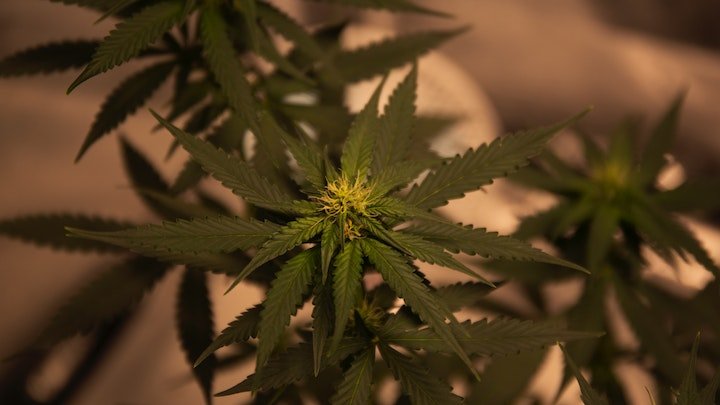
Cannabis is seen as a less harmful drug when compared with cocaine and opioid drugs, however, sustained use of the drug can cause many negative physical and mental consequences for the user, including:
- Problems with cardiovascular and respiratory systems in the body.
- Regular cannabis use can lead to physical and psychological dependence.
- Problems with aspects of cognition including memory, concentration and problem-solving.
- Mental health such as a prone to depression and anxiety
- Increased anger and aggression.
- Psychotic symptoms and links to schizophrenia.
- A drop in their motivation/enthusiasm for several activities in their lives. (9,10,13)
The exact chemical composition of cannabis is variable and unknown
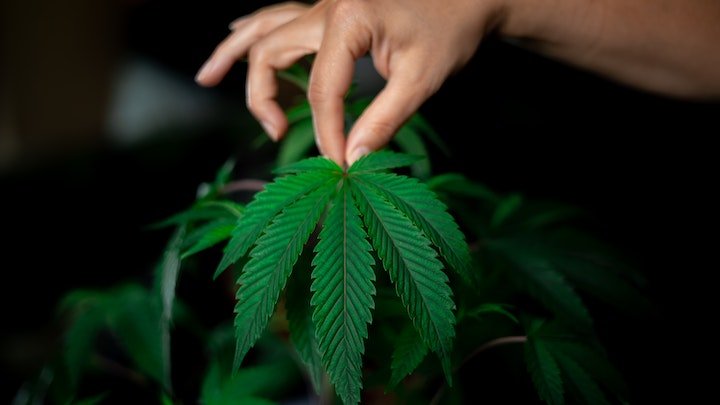
Medical scientists have suggested that there are over 500 chemicals that can be found in cannabis doses, although THC has been identified as the main psychoactive element of any dose, and is chiefly responsible for eliciting the desirable effects of the drug that users seek to experience.
It must be stressed though that scientists have been unable to establish the precise effects of many of the chemicals that can make up a cannabis dose and how they impact human psychological processing and behaviour.
It is thought there are over 50 chemicals that can generate psychoactive effects similar to THC but up until now, no experiments have been completed to analyse their biological and psychological impact on the human central nervous system. (5,6)
Blood Pressure

Every time our hearts beat, a large volume of blood is pumped around the body via the circulatory system. An individual’s blood pressure reading is based on the force required by the walls of blood vessels to carry out this pumping action.
A state of hypertension (the medical name for blood pressure) develops when the force needed to pump the blood is higher than it needs to be. Unfortunately, there are no clear warning signs present as our blood pressure increases and hypertension only becomes apparent when the heart becomes very strained and the person is vulnerable to experiencing serious health consequences
High blood pressure is a worry and it is considered a risk factor for further cardiovascular problems including heart disease, heart attack and an increased risk of having a stroke. Blood pressure measurements are viewed by the medical community as one of the key methods of assessing a patient’s cardiac health and stress levels.
What does blood pressure measure?
In essence, blood pressure measures how much blood the heart can pump around the body, the blood pressure score a person receives consists of two numbers which make up the overall blood pressure score, these are systolic and diastolic pressure. (7a)
Systolic is the force by which your heart can physically pump blood around the body to vital organs.
The diastolic pressure measurement reflects the pressure present in the arteries when your heart rests in between each beat and represents the resistance to the flow of blood in the vessels.
What is a high blood pressure (BP) score?
A blood pressure measurement of 120/80 where 120 = systolic pressure and 80 = diastolic pressure) is considered healthy. If a person’s BP measurement is too high (140/90 or over) then the person is at risk of developing hypertension which comes with several health risks that could impact heart function. (7a)
The dangers of high blood pressure

If you have been diagnosed with high blood pressure then it is imperative to try and reduce this as quickly as possible as prolonged high blood pressure can have serious consequences for our heart health.
When our blood pressure increases the arteries that carry blood and oxygen to the brain are susceptible to bursting or becoming obstructed which will lead to the person suffering a stroke.
This causes many cells located in areas throughout the brain to die as they are not receiving sufficient oxygen to function. (7a)
Long-term high blood pressure leads to heart disease
Prolonged high blood pressure will damage a person’s arteries over time and they will also lose a degree of elasticity which will result in a decrease in the flow of oxygenated blood to the heart and vital organs in the body which eventually contributes to heart disease. (1,7a)
The effects of cannabis on blood pressure and the cardiovascular system

One point that is very clear when reviewing the scientific evidence is that after consuming cannabis, individuals tend to experience a mild to moderate increase in both blood pressure and heart rate.
This usually occurs 15 to 20 minutes after the dose was consumed and the severity of the increase will depend on the chemical makeup of the dose (more specifically the % of THC present in the dose).
Scientific experiments have shown that consuming cannabis can lead to the heart beating at a faster rate and can also elevate blood pressure just after taking the drug. (1,11)
Increased risk of stroke
There is also an increased risk of having a stroke and heart disease after taking cannabis (the longer the cannabis use, the greater the risk). This can be very problematic and have serious consequences for adolescents with undiagnosed cardiac problems if they decide to experiment with cannabis use.
The World Health Organisation also reports research suggesting that there are cases of prolonged cannabis use that increase the risk of coronary heart disease in young people that were previously risk-free before smoking cannabis. (13)
Vulnerable groups
One thing that is apparent when examining the research is that anyone who is prone to experiencing high blood pressure or has suffered from any heart problems in their life should refrain from taking cannabis.
This is because the presence of THC can exacerbate high blood pressure and lead to a range of cardiac issues that could prove fatal, or at the very least cause serious symptoms which may require regular medical monitoring. (1,7,8)
Also, certain groups of people are five times more vulnerable to experiencing a heart attack within an hour of consuming cannabis. This group may include older people, obese people and those with underlying health conditions.
However, this vulnerability only lasts for an hour before disappearing. (1,8)
Research findings suggest a complicated relationship between cannabis and blood pressure.
Some research studies that have investigated the effects of THC have used healthy subjects and found that the subjects recorded an increase in heart rate, but a drop in blood pressure after taking THC.
There are also findings that indicate if participants in the research were lying down while ingesting THC their blood pressure would rise, but if they were standing up when taking the THC then their blood pressure would drop.
This suggests that there is a complicated relationship between THC and blood pressure and that it is a difficult area to draw any firm conclusions from.
Other findings related to THC
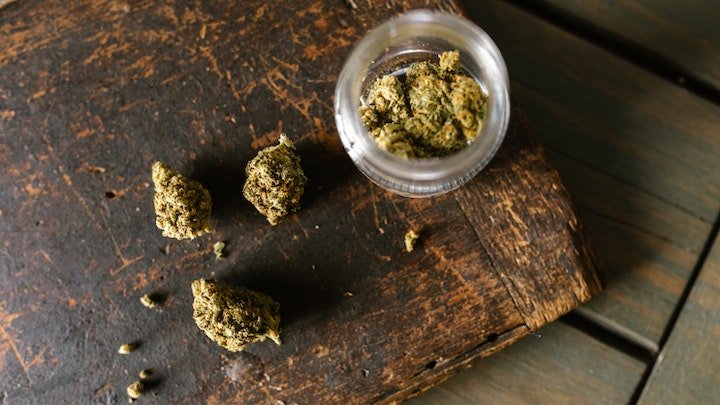
At lower doses, THC can be beneficial but at higher doses, it can cause harm. The main difficulty is that people who smoke cannabis never know precisely how much THC is present in the dose they are consuming, and it is highly likely that the next dose they smoke may differ again in terms of its THC content. (1,2,11)
Scientific analysis reveals that the effect that THC can have on blood pressure can vary depending on the way it is consumed and how often the person consumes THC as well as the overall state of their health.
Several studies have reported that THC can lead to an elevated heart rate and a rapid heartbeat of over 100 beats per minute, a condition known as tachycardia.
CBD
CBD is another significant chemical found in cannabis, it is obtained from hemp and has different effects from THC in that it does not elicit any feelings of euphoria when taken and is not considered to have any psychoactive properties.
A number of research studies suggest that it may counteract some of the negative aspects of THC.
CBD has been associated with many health benefits including pain reduction, inflammation, and anxiety. (1,7,8,11)
CBD can lower blood pressure.
Controlled experiments have revealed that CBD can reduce both systolic and diastolic pressure over a three-month period and have several benefits for the cardiovascular system as a whole.
When examining the physical effects of CBD in more depth research studies indicate that CBD is capable of having an anxiolytic effect on the human body as it is capable of relaxing arteries and veins in the circulatory system which in turn reduces internal anxiety.
This process in itself is sufficient enough to lower an individual’s blood pressure. (1,7)
There has been medical research conducted that has revealed that the CBD element in cannabis has been shown to significantly decrease both stroke volume (the amount of blood pumped out each beat) and the systolic pressure component of blood pressure. (1,8)
CBD helps with stress
CBD has also been found to minimise the negative effects that stress can have on blood pressure, and even though it may not be able to stop blood pressure from rising during stressful times, it can still keep it lower than it would have if a person did not take it. (2,7)
The composition of each cannabis dose can differ drastically
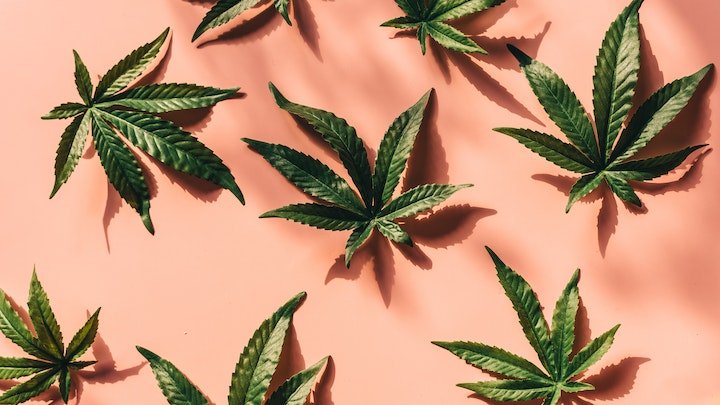
There is a huge difference in the chemical composition of cannabis doses that people ingest across the UK, let alone in the frequency and consumption patterns of each user, each of which has its own individual physiology and medical history.
Because of this, it is very challenging to research the precise effect that cannabis has on blood pressure rendering it very difficult to state any solid claims about cannabis’ potential effects.
Recent research

Very recent research conducted by a research team at Queen Mary University found that consistent cannabis use can alter both the structure and function of the heart and the cardiovascular system.
Using the latest MRI technology the researchers who closely examined the images generated of participants’ hearts found that regular cannabis use did cause the left ventricle in the heart to become enlarged.
This has implications for blood pressure as the left ventricle is the heart’s main pumping chamber. Therefore any changes in the size of the heart have consequences for the functioning of the heart which will more likely become impaired when the left ventricle is enlarged.
The more regularly and longer the participants had been smoking cannabis the more likely they were to exhibit symptoms indicating high blood pressure and a decline in heart function. (2a)
A difficult area to research

One of the main problems with conducting research into the effects that cannabis use has on our blood pressure is that there are many factors that need to be taken into account.
In order for there to be any firm conclusions drawn all the research studies investigating the area need to use exactly the same cannabis dose to ensure consistency in results.
THC and CBD are different chemicals contained in cannabis, and research that attempted to measure the effects that cannabis has on blood pressure that utilised cannabis doses containing high levels of THC would yield very different results to research studies that used cannabis doses that contained higher levels of CBD.
This makes it difficult to establish any clear findings in the area as different forms of cannabis will have different effects on blood pressure. (3,4,7)
Other relevant factors – Method of ingestion
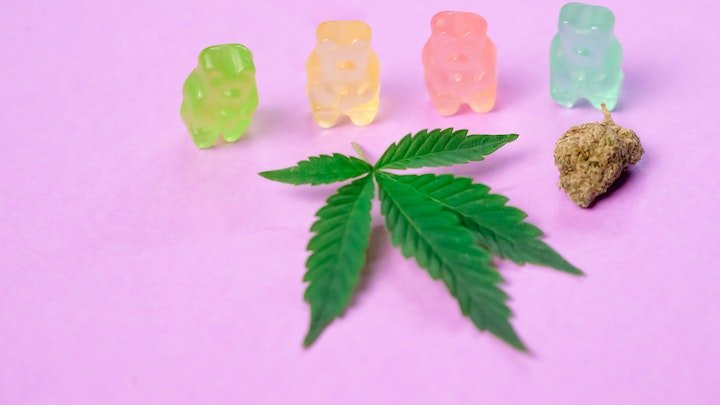
Another important factor to consider is the method of ingestion as a cannabis dose taken with tobacco would have more of a detrimental effect on the human body than if that same dose was consumed within food (e.g. cakes).
Smoking cannabis increases the risk of high blood pressure and overall harm.
It is apparent in the research that smoking cannabis is associated with a greater risk of high blood pressure as well as posing a risk to the cardiovascular system.
The act of smoking cannabis leads to THC being carried throughout the body which can be harmful and negatively impact several internal physiological processes. Cannabis smoke has similar negative effects on the body to tobacco smoke. (2,7,8)
This is because when the cigarette/tobacco or cannabis is lit, the combusting effect generates dangerous carcinogens (substances and chemicals) that can cause harm to our tissues, cells and organs.
It is also very challenging for researchers to isolate the chemicals in cannabis from other harmful chemicals in tobacco to investigate how damaging cannabis chemicals are to the cardiovascular system. (1,2)
Other factors affecting blood pressure

To complicate matters further it is very challenging to establish if it is the cannabis use alone that is contributing to high blood pressure as there are other reasons why an individual’s blood pressure may be increasing which can differ from person to person, including:
- The amount of alcohol a person consumes.
- Caffeine intake.
- Individual stress levels.
- The amount of tobacco smoked.
- Any underlying health conditions.
- Individual biological differences. (7a)
What if I cannot give up cannabis?
Cannabis users who have been diagnosed with heart problems including high blood pressure should seriously consider stopping their cannabis consumption before their condition deteriorates further.
Unfortunately, many cannabis users become reliant (dependent) on the drug both physically and emotionally and therefore find it difficult to stop taking the drug even if they have a strong desire and motivation to stop.
This means in all likelihood that they are now addicted to cannabis and require specialist drug treatment to help them overcome their addiction.
Treatment setting
In circumstances where it is essential for substance users to give up a drug of any kind for the sake of their health, medical professionals would recommend treatment in an inpatient setting instead of an outpatient setting as this possesses many advantages for the patient.
The main advantage is that the patient can solely focus on engaging in a range of interventions to overcome their addiction without being tempted back into cannabis use by negative influencers from his/her domestic and social environment. (5)
Patients following inpatient treatment programmes are based in a residential setting with a strict no-drug policy throughout the course of their treatment.
Patients are supported by a team of medical practitioners that will manage the withdrawal phase of their treatment, and psychological therapists to work on the psychological aspect of their addiction. (5)
References
(1) Abuhasira, R. et al (2020) Cannabis is associated with blood pressure reduction in older adults – A 24-hours ambulatory blood pressure monitoring study. European Journal of Internal Medicine. Vol 86. available@Cannabis is associated with blood pressure reduction in older adults – A 24-hours ambulatory blood pressure monitoring study – ScienceDirect
(2) Al-Shaaraway, O., Elbaz, H. (2016) Cannabis Use and Blood Pressure Levels: United States National Health and Nutrition Examination Survey, 2005–2012. Journal of Hypertension. August 34(8) available@Cannabis Use and Blood Pressure Levels: United States National Health and Nutrition Examination Survey, 2005–2012 – PMC (nih.gov)
(2a) Barts NHS foundation trust (2019) Researchers identify the link between cannabis use and changes to the heart. available@Researchers identify the link between cannabis use and changes to heart | Our news – Barts Health NHS Trust
(3) Centres for Disease Control and Prevention (2022) Heart Health. available@Heart Health | Health Effects | Marijuana | CDC
(4) Harvard Health (2022) Marijuana and Heart Health. available@Marijuana and heart health: What you need to know – Harvard Health
(5) Herie, A. & Skinner, W. (ed) (2014) Fundamentals of Addiction: A Practical Guide for Counsellors. CAMH. Canada.
(6) Hughes, L. (2010) Cannabis Use and Psychosis. In Phillips, P., Mckeown, O. Sandford, T. Dual Diagnosis: Practice in Context. Wiley-Blackwell. Chichester.
(7) Jadoon, K., Tan, G. and Saoirse E. O’Sullivan, S. (2017) A single dose of cannabidiol reduces blood pressure in healthy volunteers in a randomized crossover study. JCI Insight. June 2 (12). Available@A single dose of cannabidiol reduces blood pressure in healthy volunteers in a randomized crossover study – PMC (nih.gov)
(7a) National Health Service (2022) Blood pressure test. available@ Blood pressure test – NHS (www.nhs.uk)
(8) Sidney S. Cardiovascular consequences of marijuana use. The Journal of Clinical Pharmacology. 2002;42(S1):64S-70S. available@Cardiovascular consequences of marijuana use – PubMed (nih.gov)
(9) Solowij, N. (1998) Cannabis and Cognitive Functioning. Cambridge University Press. Cambridge.
(10) Stoner, S. (2017) Effects of marijuana on mental health. Alcohol and drug abuse institute, University of Washington. Available @ 2017mjdepression.pdf (uw.edu)
(11) Subramaniam VN, Menezes AR, DeSchutter A, Lavie CJ. The cardiovascular effects of marijuana: are the potential adverse effects worth the high? Missouri Medicine. 2019;116(2):146.
(12) Wernstein, A., Gorelick, D. (2011) Pharmacological Treatment of Cannabis dependence. Current Pharmaceutical Design. 17(14). available@Pharmacological Treatment of Cannabis Dependence – PMC (nih.gov)
(13) World Health Organisation (2016) The health and social effects of non-medical cannabis use. available@16015_The health and social effects of non medical cannabis Report_for Web (who.int)





